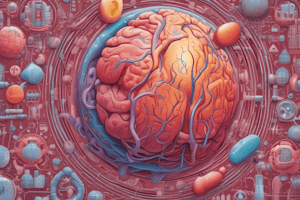Podcast
Questions and Answers
Which of the following is NOT a guideline for proper storage of medicines?
Which of the following is NOT a guideline for proper storage of medicines?
- Store capsules and tablets in the bathroom (correct)
- Do not store medicine in the refrigerator
- Store away from direct heat and light
- Keep out of reach of children
What should you do with a medicine container that has been opened?
What should you do with a medicine container that has been opened?
- Leave the cotton plug in
- Replace the cotton plug with a new one (correct)
- Remove the cotton plug
- Store the container in the refrigerator
Where should you store your medicine when traveling?
Where should you store your medicine when traveling?
- In a damp place
- In a car for a long period
- In your checked luggage
- Carry it with you (correct)
Why should you take a copy of your written prescription when traveling?
Why should you take a copy of your written prescription when traveling?
What should you do with outdated/expired medicine?
What should you do with outdated/expired medicine?
Which of the following is NOT one of the four most common types of OTC products mentioned in the text?
Which of the following is NOT one of the four most common types of OTC products mentioned in the text?
What do pain relievers do?
What do pain relievers do?
How do NSAIDs relieve pain?
How do NSAIDs relieve pain?
Which of the following is NOT mentioned as a type of pain that can be relieved by pain relievers?
Which of the following is NOT mentioned as a type of pain that can be relieved by pain relievers?
What are OTC medicines?
What are OTC medicines?
Flashcards
Medicine storage
Medicine storage
Store in a cool, dry place away from sunlight to maintain potency.
Opened medicines
Opened medicines
Keep tightly closed and label with the date opened to prevent contamination and track duration.
Traveling with medicine
Traveling with medicine
Store in original containers and keep in a carry-on for identification, temperature control, and accessibility.
Prescription copy while traveling
Prescription copy while traveling
Signup and view all the flashcards
Disposing of expired medicine
Disposing of expired medicine
Signup and view all the flashcards
Common OTC products
Common OTC products
Signup and view all the flashcards
Pain reliever function
Pain reliever function
Signup and view all the flashcards
NSAIDs and pain relief
NSAIDs and pain relief
Signup and view all the flashcards
Pain relievers: Pain types
Pain relievers: Pain types
Signup and view all the flashcards
OTC Medicines
OTC Medicines
Signup and view all the flashcards
Study Notes
Guidelines for Proper Storage of Medicines
- Store medicines in a cool, dry place away from sunlight to maintain potency.
- Do not store medicines in humid areas like bathrooms or kitchens.
Handling Opened Medicine Containers
- Once opened, keep medicine containers tightly closed to prevent contamination.
- Label opened medicines with the date to track storage duration.
Traveling with Medicines
- Store medicines in their original containers to avoid confusion and ensure proper identification.
- Keep medicines in a carry-on bag to maintain appropriate temperature and accessibility.
Importance of Prescription Copies While Traveling
- A copy of your written prescription provides essential information in case you need a refill or replacement while away.
- It serves as proof that the medication is legally prescribed, helping to avoid legal issues.
Disposal of Outdated or Expired Medicines
- Safely dispose of outdated or expired medicines at designated drug take-back locations to prevent misuse.
- Do not flush medicines down the toilet unless specifically instructed, to avoid environmental contamination.
Common Types of OTC Products
- Pain relievers, cough and cold medications, digestive aids, and allergy medicines are among the four common types.
- Beware of recognizing non-OTC products that may not fall under this classification.
Function of Pain Relievers
- Pain relievers alleviate discomfort by interrupting pain signals sent to the brain.
- They can improve quality of life by reducing pain intensity.
NSAIDs and Pain Relief Mechanism
- NSAIDs (non-steroidal anti-inflammatory drugs) alleviate pain by reducing inflammation and blocking specific enzymes.
- They are effective for conditions involving swelling, like arthritis and muscle strains.
Types of Pain Relieved by Pain Relievers
- Pain relievers address various pain types including headaches, menstrual cramps, and muscle aches.
- Certain chronic conditions may not be covered, emphasizing the need for tailored pain management.
Understanding OTC Medicines
- OTC (over-the-counter) medicines are available without prescription and treat common health issues.
- They include medications for pain relief, colds, allergies, and digestive problems, making them easily accessible for self-care.
Studying That Suits You
Use AI to generate personalized quizzes and flashcards to suit your learning preferences.



